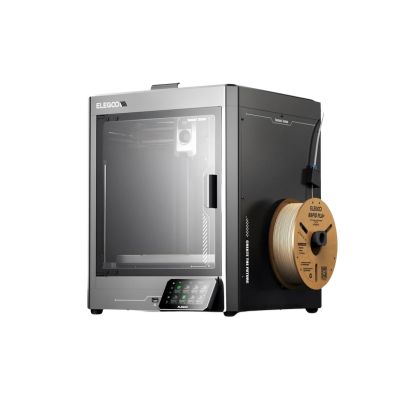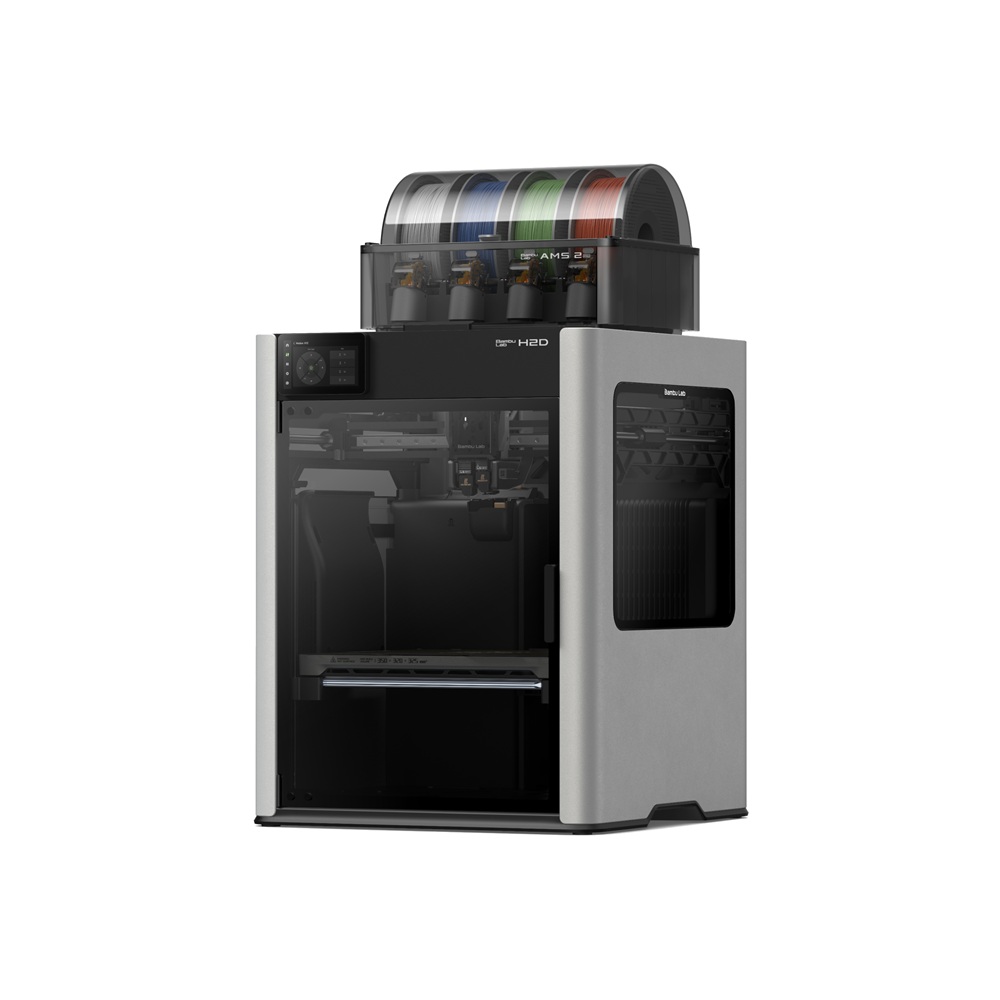Compare Centauri Carbon vs H2D
Comparison between the best 3D printers
Choose the best 3D printer at the best price. The cheapest 3D printers are here.
Buy a 3D printer here with 3D Fila.
 |
 |
|
| Model | Centauri Carbon |
H2D |
| Printing Material | Filament | Filament |
| Buy Filament for Elegoo Centauri Carbon | Buy Filament forBambu Lab H2D | |
| Estimated price | $500,00 | $1899,00 |
| Manufacturer | Elegoo | Bambu Lab |
| Release Year | 2025 | 2025 |
| Print Volume [mm] | 256x256x256 | 350x320x325 |
| Printer Size [mm] | 500x500x600 | 492x514x626 |
| Weight [kg] | 17,5 | 42,3 |
| Power Loss Recovery | YES | YES |
| Enclosed printer | YES | YES |
| Bed Leveling | Automatic | Automatic |
| Filament End Sensor | YES | YES |
| Bed type | Heated | Heated |
| Power supply system | Direct Drive | Direct Drive |
| Standard nozzle | 0,4 | 0,4 |
| Maximum Nozzle Temperature [°C] | 300 | 350 |
| Maximum Bed Temperature [°C] | 110 | 120 |
| Maximum printing speed [mm/s] | 500 | 600 |
| Filament holder | YES | YES |
| Camera for supervision | YES | YES |
| Recommended filaments | PLA, PETG, ABS, ASA, TPU, NYLON, CARBON FIBER | PLA, PETG, ABS, ASA, TPU, PVA, Nylon (PA) |
| Recommended slicers | Elegoo Slicer, Orca Slicer | Bambu Studio |
| Maximum Resolution [mm] | 0,1 | 0,01 |
| Processor | ||
| Display | Touchscreen 4,3'' | Touchscreen 5'' |
| Power Supply | 350 W | |
| Connectivity | WiFi, SD, USB | Wifi, Bambu bus, Cartão SD |
| Operating systems | Windows, Linux e Macbook | Windows, Mac, Linux |
| Date of registration in the system | 2025-02-10 | 2025-03-31 |
| Release date | 2025 | 2025 |
| Extra features | The Elegoo Centauri Carbon is a CoreXY 3D printer with an enclosed structure, direct drive extruder, and hardened steel components for abrasive materials. It features automatic bed leveling, a touchscreen, a filament cutting system, and an elongated nozzle designed to reduce clogs. It offers Wi-Fi connectivity for remote file transfer and runs on a Klipper-based firmware, providing advanced control and precise adjustments. | Bambu Labs H2D combines high-speed 3D printing with a chamber heated up to 65 °C, dual extrusion with automatic nozzle switching, an AMS for filament drying and exchange, and AI sensors that detect failures. It offers optional laser and digital cutting capabilities, features intelligent calibration through computer vision, vibration control, enhanced fire safety, and real-time camera monitoring. |
| Support for multiple colors and materials (AMS and CFS) | NO | YES |
Notes * |
||
| Cost-benefit | 8 / 10 | 7 / 10 |
| Hardware | 6 / 10 | 8 / 10 |
| Tela | . | . |
| Print volume | 4 / 10 | 4 / 10 |
| Performance | 4 / 10 | 5 / 10 |
Conclusion |
| In comparing the Elegoo Centauri Carbon and the Bambu Lab H2D, it is clear that both 3D printers have their unique strengths and weaknesses tailored to different user needs. The Elegoo Centauri Carbon, priced more affordably, offers a solid feature set for hobbyists and those new to 3D printing. With a decent print volume, automatic bed leveling, and compatibility with a range of filaments, it is an excellent choice for users seeking a reliable and versatile machine without breaking the bank. Its emphasis on cost-effectiveness is evident in its high score for cost-benefit, though it scores lower in hardware and performance compared to its more expensive counterpart. On the other hand, the Bambu Lab H2D enters the market as a high-performance printer designed for professionals and serious enthusiasts. Its advanced features, such as dual extrusion, intelligent calibration, and a higher maximum nozzle temperature, emphasize speed and precision. While its higher price reflects its capabilities, it may be overkill for those simply looking to explore 3D printing or create basic models. Moreover, the H2D does offer support for more complex projects with multiple materials and colors, which can be a significant advantage for users focused on professional applications. Ultimately, the choice between these two printers revolves around budget and intended use. For those prioritizing cost and versatility, the Elegoo Centauri Carbon presents an impressive option. However, for users seeking cutting-edge technology and advanced printing capabilities, the Bambu Lab H2D is undoubtedly the better investment, assuming the higher price aligns with their printing needs and budget. |

